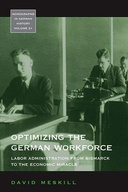Explore
During the twentieth century, German government and industry created a highly skilled workforce as part of an ambitious program to control and develop the country’s human resources. Yet, these long-standing efforts to match as many workers as possible to skilled vocations and to establish a system of job training have received little scholarly attention, until now. The author’s account of the broad support for this program challenges the standard historical accounts that focus on disagreements over the German political-economic order and points instead to an important area of consensus. These advances are explained in terms of political policies of corporatist compromise and national security as well as industry’s evolving production strategies. By tracing the development of these policies over the course of a century, the author also suggests important continuities in Germany’s domestic politics, even across such different regimes as Imperial, Weimar, Nazi, and post-1945 West Germany.
This book is included in DOAB.
Why read this book? Have your say.
You must be logged in to comment.
Rights Information
Are you the author or publisher of this work? If so, you can claim it as yours by registering as an Unglue.it rights holder.Downloads
This work has been downloaded 541 times via unglue.it ebook links.
- 148 - pdf (CC BY-NC-ND) at Unglue.it.
- 93 - pdf (CC BY-NC-ND) at OAPEN Library.
- 267 - pdf (CC BY-NC-ND) at berghahnbooks.com.
Keywords
- corporatism
- Economic history
- Employees
- German history
- History
- History / Europe / Germany
- KUnlatched
- labor history
- Labor market
- Labour history
- Training of
- vocational training
Editions

